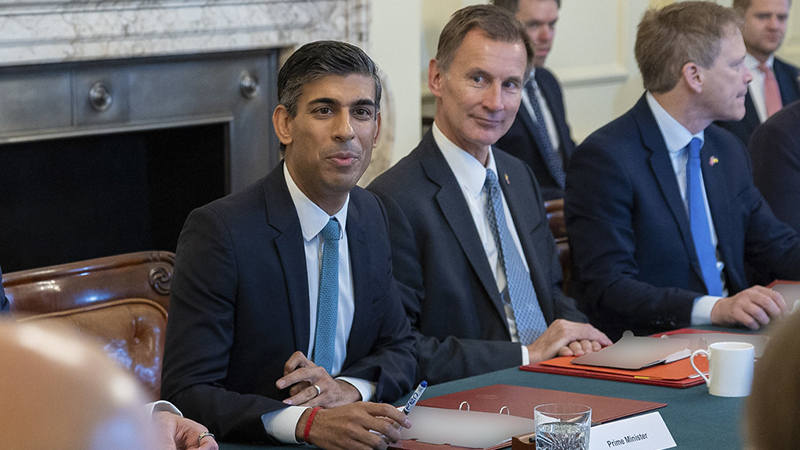Monday 14 November
- – Trading statement from Informa
- – Rightmove UK house price index
- – German wholesale price inflation
- – EU industrial production
- – In Europe, quarterly results from Vantage Towers
- – In the US, quarterly results from Tyson Foods, Nu Holdings and Tower Semiconductor
Tuesday 15 November
- – First-half results from Land Securities, Workspace, Speedy Hire and Wincanton
- – Trading statement from BAE Systems
- – Chinese monthly growth in fixed asset investment, retail sales and industrial production
- – EU Q3 GDP growth
- – US producer price (factory gate) inflation
- – G20 meeting starts in Bali, Indonesia (first of two days)
- – In Asia, quarterly results from Sea Ltd
- – In Europe, quarterly results from Infineon
- – In the US, quarterly results from Wal-Mart, Home Depot and Tencent Music
Wednesday 16 November
- – Full-year results from Sage
- – First-half results from SSE, Experian, British Land and Premier Foods
- – Trading statements from Hill & Smith and Mediclinic International
- – UK inflation
- – US retail sales
- – US NAHB housebuilders’ survey
- – US oil inventories
- – In Asia, quarterly results from Tencent
- – In Europe, quarterly results from Siemens Energy and Alstom
- – In the US, quarterly results from NVIDIA, Cisco, Grab and Target
Thursday 17 November
- – UK autumn statement from chancellor of the exchequer Jeremy Hunt
Chancellor Jeremy Hunt is due to give the long-awaited autumn statement in the House of Commons on Thursday. Having originally been planned for Halloween, the statement was delayed until 17 November following Rishi Sunak’s appointment as prime minister.
Following his short-lived predecessor Kwasi Kwarteng’s mini-budget in September, which featured low-tax and high-spending measures that Hunt largely reversed, industry commentators are predicting changes to the dividend allowance as a part of wider tax increases with the chancellor looking to raise money to decrease the budget deficit.
Shaun Moore, chartered financial planner at Quilter, said: “Tweaking the dividend allowance or scrapping it altogether could be one way to achieve some additional cash for the government. The dividend allowance was introduced to help savers and when it was reduced in 2017, the new £2,000 allowance still covered the majority of savers’ dividend income. Lowering it further will mean more and more people end up paying tax on their dividends.
“At present, you do not pay tax on any dividend income that falls within your personal allowance. You also get a dividend allowance each year, which is set at £2,000 per year and you only pay tax on any dividend income above this allowance. However, if Sunak and Hunt want to reduce the allowance this will mean you have to pay more tax on any dividends you receive and the amount of tax ratchets up depending on what tax band you are in.”
Moore continued: “Dividends are a popular way of creating a regular income from investments and therefore reducing the allowance or scrapping it altogether could end up meaning those who rely on dividends for the bulk, or all of their regular income will see this taxed at a much higher level.”
- – Full-year results from Virgin Money UK and Grainger
- – First-half results from Burberry, Spirax-Sarco Engineering, Halma and MITIE
- – Q1 results from Close Brothers
Also on Thursday, Close Brothers Group announces their Q1 results. For the financial year ending 30 July, the FTSE 250 firm reported an adjusted operating profit of £234.8m, down from £271m in 2021.
Steve Clayton, head of equity funds at Hargreaves Lansdown, said: “The group has been under a cloud of late, with momentum impacted by slower levels of trading activity in its market-making division. Meme-related trading had driven a surge in volumes at Winterflood, but these have now ebbed back to more normal levels. This should lead to the focus returning onto the core banking division, where we expect lending to remain strong with little impact to margins from bad debts at this stage.
“The outlook statement will be key; Close Brothers lends only in the UK and so its loan book is fully exposed to the domestic economy. Any comments about credit quality could well impact both Close Brothers itself and also investors’ attitudes toward the wider banking sector.”
- – Trading statements from Kier and Keller
- – US new building permits
- – US new housing starts
- – US weekly unemployment claims
- – In Asia, quarterly results from Alibaba
- – In Europe, quarterly results from Siemens
- – In the US, quarterly results from Applied Materials and Macy’s
Friday 18 November
- – First-half results from Fuller, Smith & Turner
- – UK retail sales
- – UK GfK consumer confidence survey
Wednesday’s inflation and unemployment figures will shape the latest UK consumer confidence survey to be released on Friday.
While the earlier figures may steal the macroeconomic headlines, for AJ Bell’s investment director Russ Mould and financial analyst Danni Hewson, Friday’s survey may be the most “intriguing” statistic of the week.
Mould and Hewson said: “It is worth reinforcing the importance of the twin evils of inflation and unemployment when it comes to consumer confidence. This can be seen by comparing the headline GfK survey reading Arthur Okun’s Misery Index – which is derived by adding the prevailing rate of inflation to that for unemployment – and reinforces the balancing act that the Bank of England has when it comes to setting interest rates.
“It can’t let inflation run amok but equally it might not want to put down the hammer too much as that could drive up unemployment. Equally, a sustained drop in the misery index could boost consumer confidence and give companies which rely on discretionary spending a lift, too.”
- – US existing homes sales figures
- – In Asia, quarterly results from JD.com
- – In the US, quarterly results from Foot Locker










